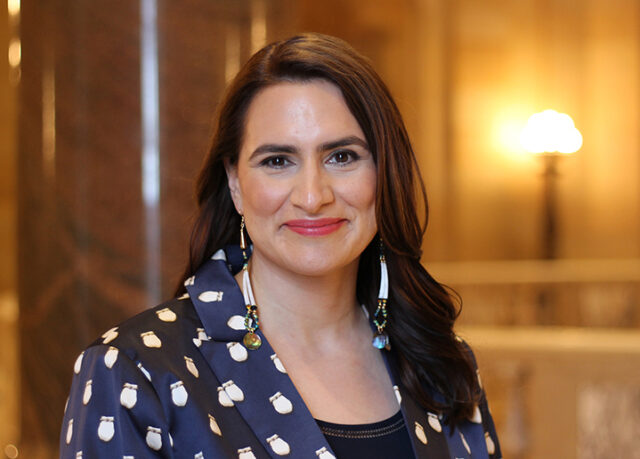By Lt. Gov. Peggy Flanagan
Boozhoo! I hope you all have had a chance to enjoy this beautiful summer weather. Here in Mni Sota Makoce, we are so fortunate to have access to beautiful natural resources, and this season is one of the best times to enjoy them: from abundant agricultural produce to swimmable lakes and streams to our beautiful state parks. But we know the things that we love most about Minnesota are threatened by climate change.
In June, I had the incredible honor to address the National Congress of American Indians (NCAI) during their mid-year conference hosted by the Shakopee Mdewakanton Dakota Community. The theme of this conference was our climate future. Tribes have been leaders in climate change work. Tribal governments and Indigenous people are key partners in the state’s climate work.
I’m grateful for the opportunity to continue to reflect on some of our key legislative victories from this past session, with NCAI and with all of you.
The environmental omnibus bill makes key investments in our land and natural resources, including beginning the process of transferring the land from Upper Sioux Agency State Park back to the People of the Yellow Medicine (Upper Sioux Community). This bill also established a Tribal Energy Council, which will work in partnership with the Minnesota Department of Commerce on energy issues, and $4 million to establish a new tribal assistance program at the Minnesota Pollution Control Agency to help tribal governments when applying for and managing environmental and climate grants. Other key victories include investments to help make state parks more inclusive and accessible, improve community climate resiliency, reduce greenhouse gas emissions, and enhancing pollinator habitats. Overall, Minnesota Legislature approved more than 40 climate initiatives in energy, environment, agriculture, health, transportation, and construction, all aligned with the implementation of Minnesota’s Climate Action Framework.
The human services omnibus bill helps address some of the biggest crises facing our communities, such as the opioid and addiction epidemic and food insecurity. Our budget allocates over $200 million to tackle the opioid and addiction crisis, which we know disproportionately impacts Native people in Minnesota. It was critical that these investments include ongoing funding for traditional healing grants to ensure our cultural practices are part of the solution to end this crisis. We included a new seat for a representative of the urban Indian community on the Opioid Epidemic Response Advisory Council, which is also required now to consult with the 11 tribal nations on an annual basis to ensure that our voices are part of the solutions. This bill also included funding to promote food security among Tribal Nations and in American Indian communities and increase access to traditional foods. Tribes are eligible to apply for capital funding to improve or expand food shelf or food program facilities.
We know that prohibition doesn’t work – which is why we worked with our partners in the legislature to enact a bill legalizing adult-use cannabis. The bill also establishes a new Office of Cannabis Management to regulate the new industry, directs for the expungement or resentencing of cannabis related convictions, and includes a 10% tax on recreational cannabis for non-tribal businesses. I’m particularly excited about several provisions directly related to Tribal governments, including creating a clear legal status for the operation of Tribal medical cannabis programs, authorizing the Governor to enter into compacts with interested Tribes related to adult-use cannabis and medical cannabis, and applying no sales tax or cannabis gross receipts tax for cannabis sales on reservations.
Cannabis use and possession of certain amounts will be decriminalized beginning August 1. The bill allows for non-tribal sales of legal adult-use cannabis in Minnesota to begin in the first quarter of 2025. Adult-use medicinal and recreational cannabis use and sales on tribal lands will be regulated by the Tribes.
No one should have to choose between caring for themselves or a family member and a paycheck. Whether you’re welcoming a new baby to your family, healing from an illness or injury, or acting as a caregiver for an aging loved one, you should be able to take the time you need without risking financial instability. This bill creates a state paid family and medical leave program which will provide partial wage replacement for 12-20 weeks of leave in a 52-week period for medical leave, bonding, or caring for a family member beginning in January 2026.
I want to end with incredible gratitude and relief for the recent Supreme Court decision which upheld the Indian Child Welfare Act as constitutional, recognizing our right to keep our babies, raise our babies and love our babies, securing the right of our children to be raised in their culture and identity, and safeguarding the future existence of Tribes and their sovereignty. It matters when our voices are heard and listened to in every place and space where decisions are made – when the highest court of the land recognizes that we are still here, and we will continue to be here, as our authentic, full Indigenous selves, long into the future.
Miigwech






